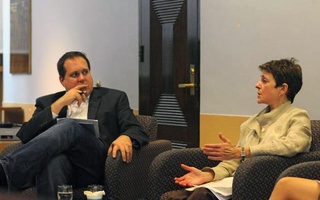
Over desert from Finale, Professor Nancy Cott spoke to students in the Quincy Junior Common Room last night about her experience in California's Proposition 8 trials. Cott, the Jonathan Trumbull Professor of Human History and Director of the Schlesinger Library at Harvard, testified on marriage in the Perry v. Schwarzenegger case. Moderated by the Radcliffe Union of Students and Tim McCarthy of the Carr Center for Human Rights Policy, the conversation was part of the RUS Dessert Discussions.
The Radcliffe Union of Students teamed up with Quincy Conversations last night to host History Professor Nancy F. Cott to discuss her research on the changing role of marriage as a public institution and her experience as an expert witness in Perry v. Schwarzenegger.
The case treated the legal challenge to Proposition 8, the amendment restricting the definition of marriage to opposite-sex couples in California.
“Cott’s research is important from a feminist perspective because it dismantles the perceptions we have of marriage as a partnership of two people with distinct roles,” said co-president of RUS Shanti S. Kris ’12. “Her research demonstrates that, even in heterosexual marriages, those roles have become much less distinct than they used to be.”
In addition to noting shifts in gender roles, Cott tied the evolving character of marriage to other ongoing social developments such as divorce laws, race relations, and changing definitions of marriage itself.
“These institutions that we so often think are as old as time do change,” said History and Literature Lecturer Timothy P. McCarthy ’93, who moderated the discussion. “The idea that things do and can change goes to the root of the logic, or illogic, of the opposition’s argument that marriage is a timeless institution that has never changed and must continue to never change.”
Cott emphasized the significant changes in the legal and institutional meaning of marriage over the years. She cited changes in legislation around divorce grounds, relative gender roles of men and women within marriage, and the removal of racial restrictions as watershed changes in conceptions of marriage.
“Legislatures over time have changed all these things, so the potential for the change of allowing same-sex couples to marry is certainly within the power of legislatures,” she said.
Relating to her role as an expert witness in the Proposition 8 trial, Cott said that the defending side’s argument was “monotone,” resting its justification of Proposition 8 on the idea that marriage is about procreation and that having one male and one female parent constitutes the best setting for a child to be raised.
“There are lots of ways to poke holes in this argument,” said Cott, noting that there has never been a law requiring couples to be able to reproduce to marry, and that a range of studies have shown that children’s wellbeing is dependent on the quality of care given by parents, not their sexual identities.
She added that above and beyond these arguments, marriage functions as an economic support system and a contract between individuals and the state. With the state’s investment in the institution of marriage, she argued, unmarried people are disfavored no matter who their choice of partner is.
“In the end, the reason I’ve been involved in these cases is that I believe the right to marry the person you love is a civil right,” Cott said.
McCarthy said that Cott’s historical perspective is significant in the trajectory of a pressing social issue.
“This historical context allows activists and those of us involved in the struggle for equality to see we can change these laws and re-imagine them in a way that is more equitable and just,” he said. “It allows us to make stronger arguments, to see the past as constantly changing, and to hope that change can come about in the future.”
—Staff writer Alice E.M. Underwood can be reached at aeunderw@fas.harvard.edu
Read more in News
‘The Challenge’ Seeks Diabetes CureRecommended Articles
-
UCLA Protests Carnesale's Reticence on 209Nearly 100 students were arrested last night at UCLA after taking over a university building in protest of Chancellor Albert
-
The Very Model of an OperettaW HEN DUTY CALLS, Frederic follows. Duty can be a harsh taskmaster, and in The Pirates of Penzance her demands
-
 Harvard Myths Debunked
Harvard Myths Debunked -
3rd Year Law Class SmokerThe third year class of the Law School will hold a smoker in the Union on Friday evening at 8.30
-
 Harvard History Professor Testifies in Proposition 8 Case
Harvard History Professor Testifies in Proposition 8 Case -
 Profile: Nancy F. Cott
Profile: Nancy F. Cott













